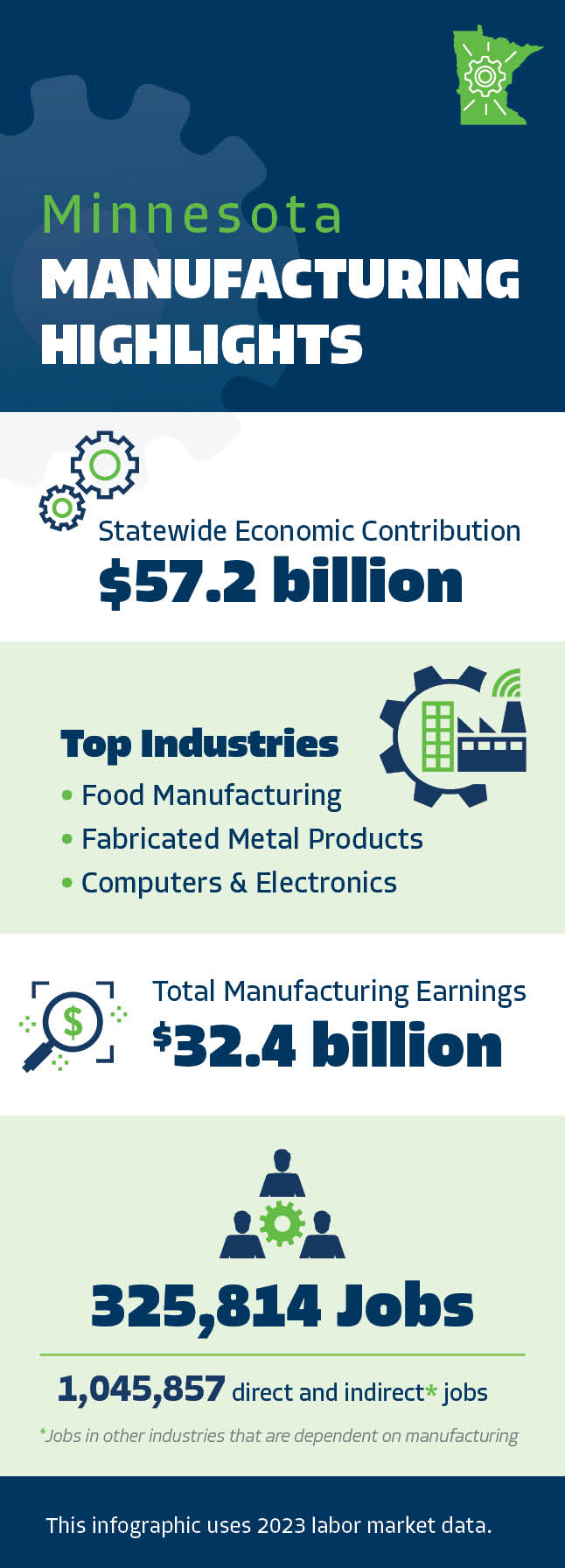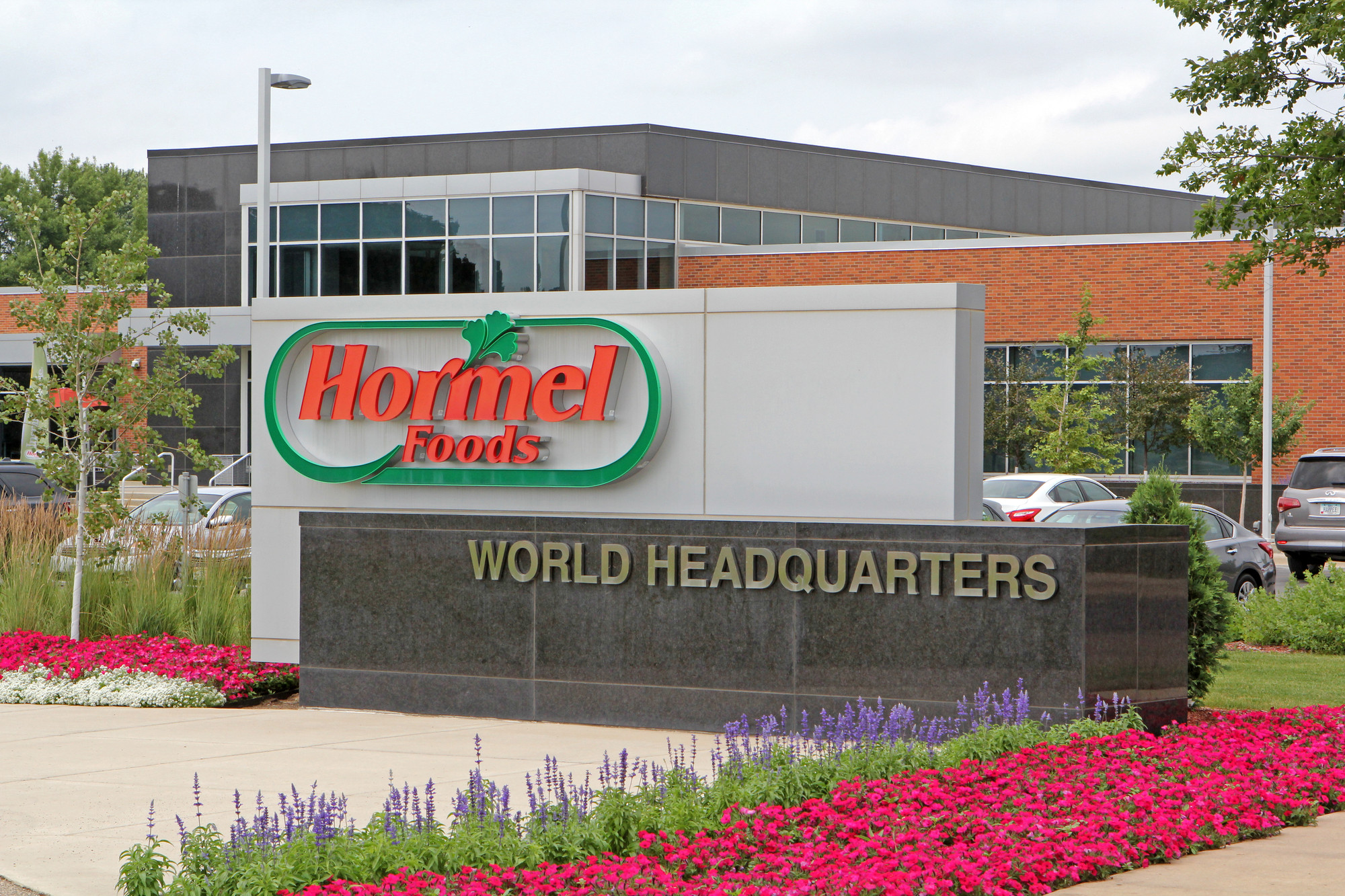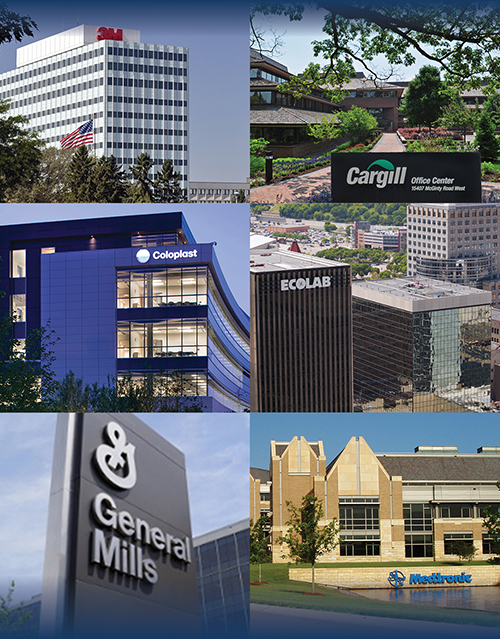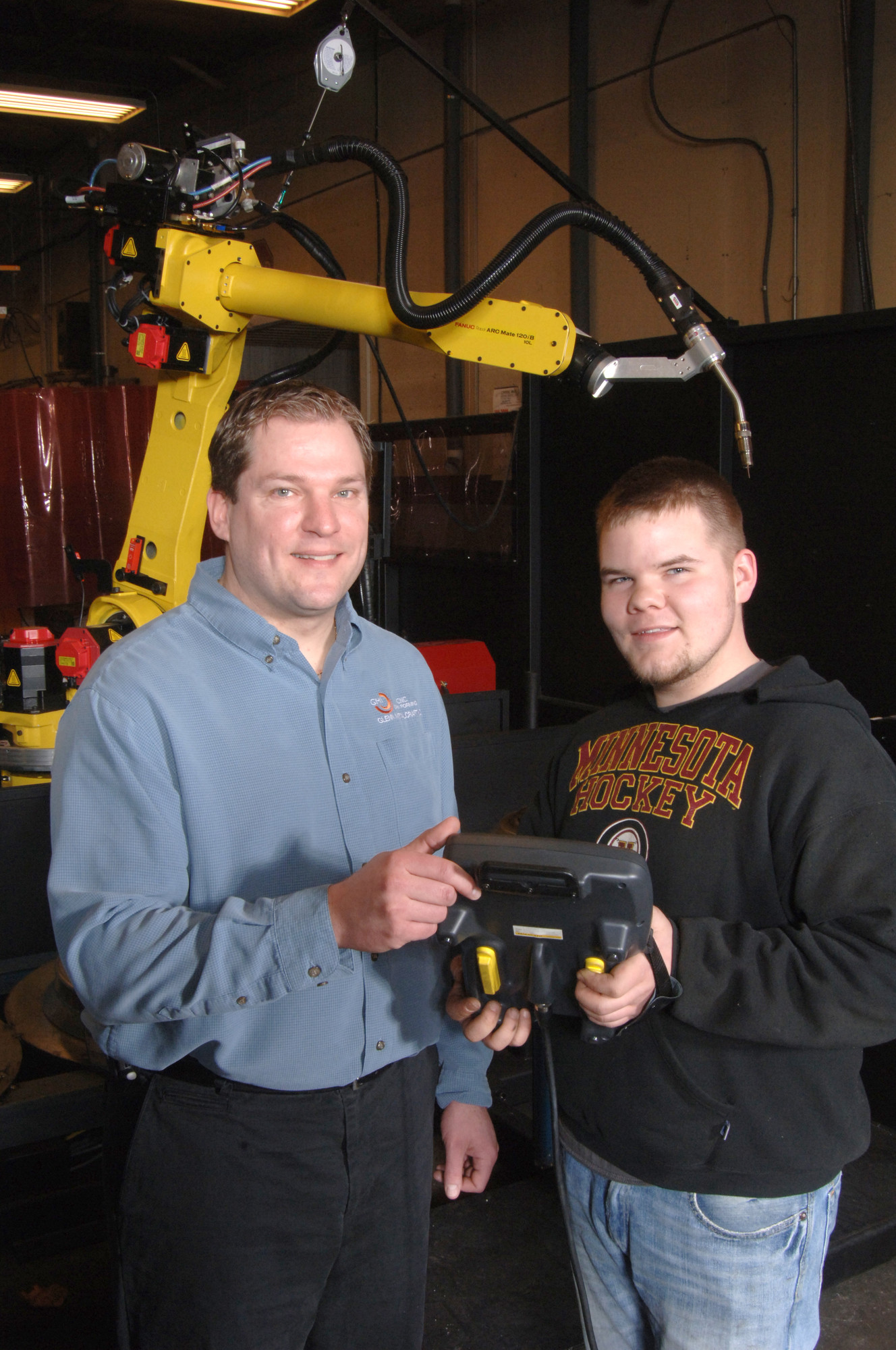Advanced Manufacturing
Building things by hand for the world to enjoy

Minnesota's manufacturing sector is the backbone of the state's economy. Our history of innovation, along with our highly skilled workforce, makes the state a hotbed of manufacturing. Minnesota's diverse, technology-driven advanced manufacturing sector is strong in high-tech manufacturing, including computers and electronics, medical devices, vehicles and more.
Minnesota's advanced manufacturing industry:
- Includes 8,625 companies, making a wide range of products. (DEED).
- Contributed $57.2 billion in 2023 to the state's economy. (Bureau of Economic Analysis).
- Exported $22.5 billion worth of goods in 2023. (Census Bureau).
- Accounts for 11% of statewide employment. (DEED).
- Represents 12% of our state's Gross Domestic Product (GDP) by industry*. (Bureau of Economic Analysis).
- Employs 325,814 highly skilled workers. (DEED).
* Current GDP.
Industry Leaders
- About 40% of Minnesota's Fortune 500 companies are involved in manufacturing, including 3M, CHS, General Mills, Land O'Lakes, Ecolab, Hormel Foods, Polaris and Fastenal.
- Cargill, the largest private company in the country, has significant manufacturing operations in the state.
- 3M is the state's largest manufacturer in Minnesota.
- Other manufacturing companies headquartered or with large operations in the state include Medtronic, Andersen Windows, H.B. Fuller, and Toro, just to name a few.
While the Twin Cities is home to a majority of our largest companies, many others are thriving in small cities in every corner of the state.
Here are some of the most successful manufacturing companies headquartered or operating in Greater Minnesota:
- IBM, computer manufacturer, Rochester, Minn.
- AGCO, tractor manufacturer, Jackson, Minn.
 New Flyer, bus manufacturer, St. Cloud, Minn.
New Flyer, bus manufacturer, St. Cloud, Minn.- Hormel Foods, food manufacturer, Austin, Minn.
- Marvin Windows and Doors, Warroad, Minn.
- Andersen Windows, Bayport, Minn.
- Sage Electrochromics, electrochromic glass manufacturer, Faribault, Minn.
- Arctic Cat, snowmobiles/recreational vehicles manufacturer, Thief River Falls, Minn.
- Polaris, snowmobiles/recreational vehicles manufacturer, Medina, Minn.
- Fastenal, diversified tools and parts manufacturer, Winona, Minn.
- Cirrus Aircraft, aerospace product and parts manufacturer, Duluth, Minn.
Our Advanced Manufacturing Ecosystem
Labor Force
Minnesota has one of the most educated workforces in the country, with 94% of the adult population possessing a high school degree and 39% having a bachelor's degree or higher. The labor force participation rate of 68% is the eighth-highest in the country, reflecting a strong work ethic.
Minnesota's skilled labor force offers a pool for a broad range of manufacturing industries. Our most robust clusters are food production, computer and electronics, fabricated metal, machinery, and medical devices.
Minnesota is one of the top employers in advanced manufacturing, ranking:
- 2nd in electromedical and electrotherapeutic apparatus manufacturing (15,643)
- 3rd in computer storage device manufacturing (1,808 jobs)
- 4th in medical equipment and supplies manufacturing (19,245 jobs)
- 4th in computer terminal and other computer peripheral equipment manufacturing (1,776 jobs)
- 5th in food product machinery manufacturing (1,267 jobs)
- 6th in computer and peripheral equipment manufacturing (5,806 jobs)
- 7th in precision turned product manufacturing (2,346 jobs)
- 8th in farm machinery manufacturing (3,408 jobs)
- 8th in machine shops (12,584 jobs)
-
Source: Lightcast.
R&D
Minnesota is home to some of the largest R&D spenders in the country. Among the top is 3M, a beacon for innovation that spends close to $2 billion annually in R&D. Other manufacturing companies headquartered or operating in Minnesota with significant R&D expenditures include Medtronic, Abbott Laboratories, General Mills, Ecolab, and Coloplast, among others.
- 3M invests about 5% of sales back into R&D annually.
- 3M produces an average of 3,500 patents annually.
- Medtronic spent $2.7 billion in R&D for the fiscal year ending April 2023. The company is headquartered in Dublin, Ireland and Minneapolis, Minnesota.
- Massachusetts-based Boston Scientific Corp., which has a significant Twin Cities presence, spent $1.4 billion on R&D the fiscal year 2023, or 10% of its net sales.
- Chicago-based Abbott Laboratories, another company with a sizable local presence, spent $2.7 billion on R&D the fiscal year 2023.
- Minnesota-based General Mills' R&D expenditures were $257.6 million in fiscal 2023.
- Another Minnesota-based company, Ecolab, has a significant R&D facility on their 90-acre campus in Eagan, Minn. Ecolab R&D expenditures were $192 million in 2023.
Patents

Minnesota companies have been granted thousands of patents in a wide variety of technology fields. The state's companies are giants in innovation of everything from food products, computers, medical devices to avionics. Here is a taste of our creativity:
Patents Granted to Manufacturing Companies Operating or Headquartered in Minnesota 2000-2023:
- IBM: 9,913
- 3M: 9,865
- Medtronic: 5,940
- Cardiac Pacemakers: 3,536
- Honeywell International: 3,519
- Seagate Technology: 3,431
- Boston Scientific: 2,006
- Ecolab: 1,596
- Donaldson: 872
- Micron Technology: 720
- General Mills: 596
- Caterpillar: 589
- Polaris Industries: 558
- Cargill: 370
- Coloplast: 251
- Lockheed Martin Corporation: 231
*Patents attributable to Minnesota operations.
Source: U.S. Patents and Trademark Office.Industry Support
Our industry associations and economic development entities actively support and grow the state's robust manufacturing sector.
- The Minnesota Precision Manufacturing Association has been in existence for over 65 years and has over 300 members consisting of precision and advanced manufacturing companies; supply chain companies such as steel, machine tool dealers, heat treaters, platers; service members; and schools, colleges and universities.
- Enterprise Minnesota has been supporting Minnesota's manufacturers for over 30 years. They are a consulting organization that helps manufacturing companies become operationally efficient and positioned to grow. The group also serves as the Minnesota connection to the MEP National Network, a public-private partnership that delivers comprehensive, proven solutions to U.S. manufacturers, fueling growth and advancing U.S. manufacturing.
 Central Minnesota Manufacturers Association offers assistance in the central part of the state to members, who include manufacturers, distributors/suppliers, professional services, and K-12 education.
Central Minnesota Manufacturers Association offers assistance in the central part of the state to members, who include manufacturers, distributors/suppliers, professional services, and K-12 education.- Midwest Manufacturers Association is a nonprofit organization that fosters industry associations' creation, growth, and success throughout the Midwest.
- Dream It. Do It: A national manufacturing career recruitment strategy. Minnesota is one of the states participating in the Dream It. Do It. effort to attract workers to fill the approximately 600,000 open manufacturing jobs in the U.S.
University of Minnesota
- The University of Minnesota ranks 14th in R&D expenditures among public universities, with $1.13 billion in 2023.
- In 2022, the University announced it had spun out 230 companies since FY2006 with an impressive rate of success. These firms have a survival rate of 77% and 71% of companies have been located in Minnesota.
- U of M Technology Commercialization facilitates the transfer of U of M technologies and research to licensee companies to develop new products and services that benefit the public good, foster economic growth, and generate revenue to support the University's mission.
Incubators and Accelerators
Minnesota is committed to nurturing the next generation of entrepreneurs and technologies through a wide range of programs and services:
- Launch Minnesota, an award-winning initiative developed through the Minnesota Department of Employment and Economic Development, serves as an entry point for innovators and startups. It offers innovation grants and helps startups access capital and connect with resources, expertise and training.
- Over two dozen accelerators and incubators help startups across the state. One of the first, University Enterprise Laboratories, serves as an incubator for early-stage companies in life sciences, biotech, and other science/technology industries.
